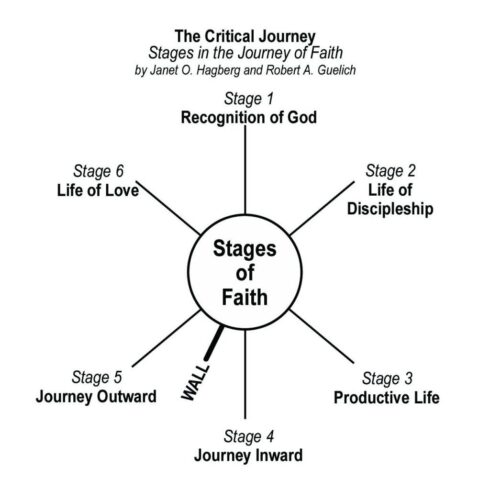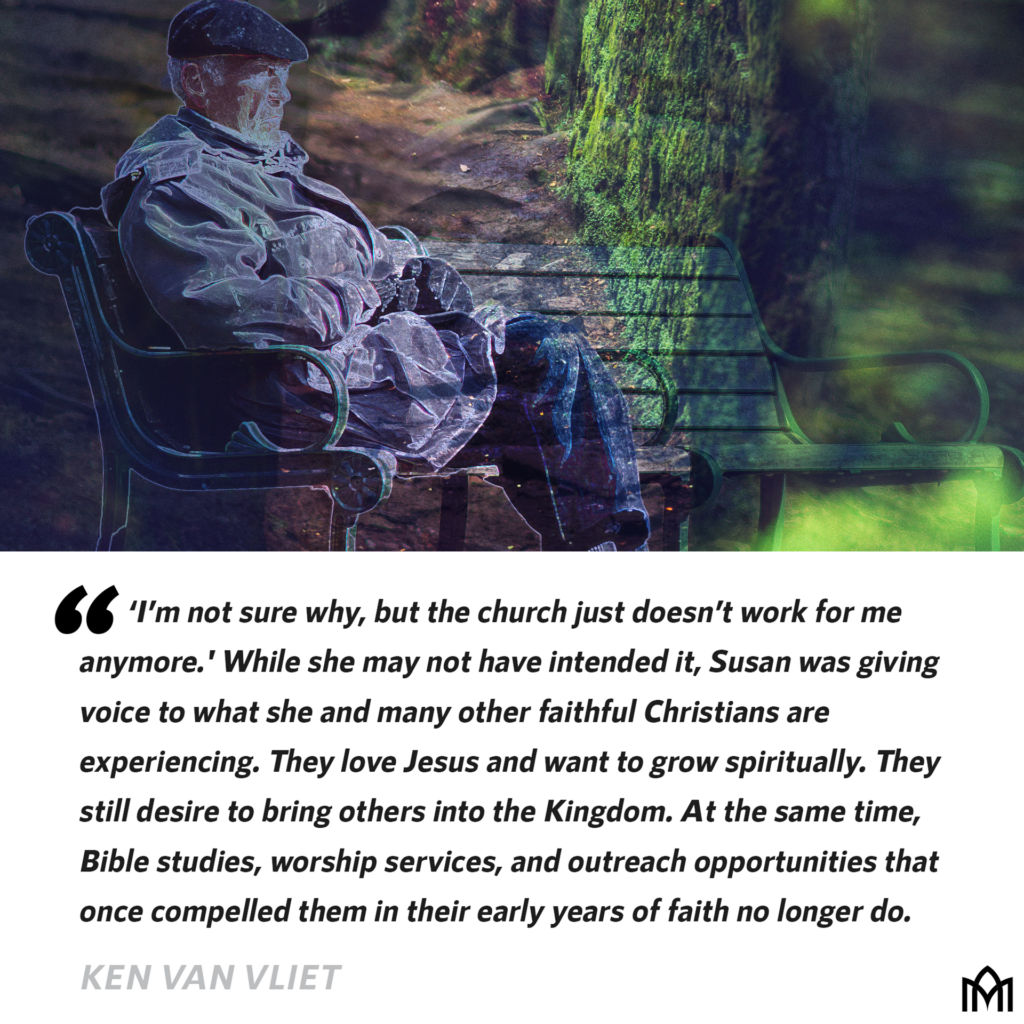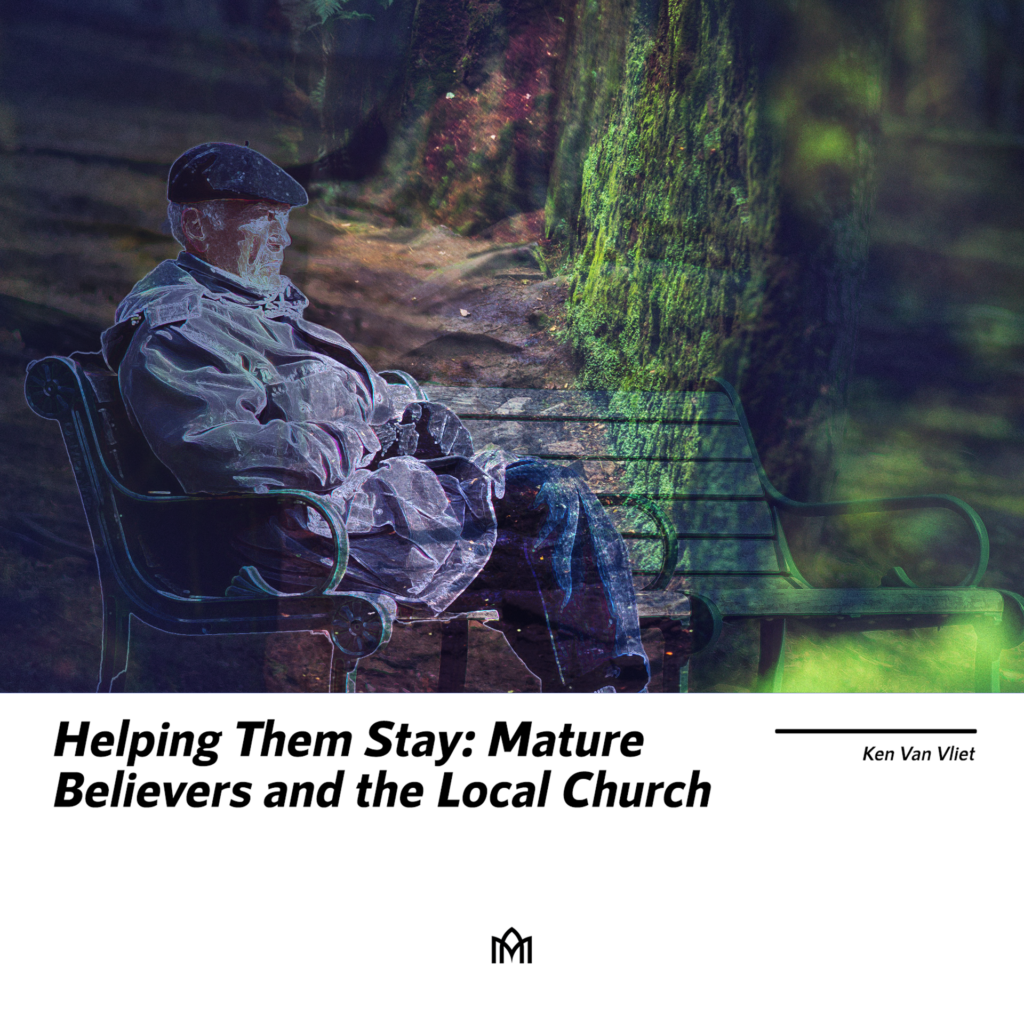Helping them Stay: Mature Believers and the Local Church (Pt. 2)
*Editorial Note: Given Ken Van Vliet’s wise, in-depth treatment of how to form Christ-followers well throughout all six stages of The Critical Journey, and the desire to invite you to sit with God with all that you have read so far, we published the first part of Ken’s piece yesterday as “Helping them Stay: Mature Believers and the Local Church (Pt. 1).” ~CK
Review
Before unpacking Stages 5 and 6, I thought it would be helpful to briefly review Janet Hagberg and Robert Guelich’s insights regarding the developmental life of faith, as found in their seminal work, The Critical Journey: Stages in the Life of Faith, taken from yesterday’s piece, “Helping them Stay: Mature Believers and the Local Church (Pt. 1).”
The Critical Journey: Stages in the Life of Faith
- Stage 1 – A Recognition of God: Through curiosity, openness and awe, a person comes to believe God is real. This stage is about awareness and conversion.
- Stage 2 – The Life of Discipleship: Through Bible studies, teaching, reading, relationships and worship experiences, the new believer grows in their understanding of who God is, and who they are in relationship to both God and the community of faith. This stage is about learning.
- Stage 3 – The Productive Life: Marked by the desire to make a difference, the disciple gets busy serving and putting into practice the teachings they have learned. This stage is about doing.
- Stage 4 – The Journey Inward: Most often brought about by a crisis of faith, this inward turn begins when a person’s experience of God no longer matches what they have learned about God. Often marked by uncertainty, doubt, unsettling questions and a sense of losing their faith, this stage is about deconstruction.
- The Wall: While not a separate stage, The Wall marks the transition from following God for our sake to following God for God’s sake. It is aptly named The Wall because moving through it is difficult, requiring the release of ego, the surrender of the will, and the acceptance of God’s purposes over our own.
- Stage 5 – The Journey Outward: Many experience this stage as ‘being born-again, again.’ There is a renewed sense of awe, and a deep knowing of oneself as God’s beloved. This outward turn is marked by a move from away from self-centeredness towards others-centeredness, as well as a move from being driven by shame, duty, and unhealthy guilt, to being drawn by the love of God. This stage is about a deeper, more authentic integration of faith and life.
- Stage 6 – The Life of Love: Marked by humility, sage wisdom acquired through life’s experiences, and a deep surrender to, and trust in, God, this final stage is about compassion for others, healthy detachment from worldly things, and a life fully abandoned to God.

Stage 5 – 6: The Same, but Different
Ironically, one of the more difficult tasks for church leadership is to help the ‘Post-Wall’ believer understand they still need the church. When emerging from The Wall into The Journey Outward it is common for a believer to dismiss the very organization that was so vital in their earlier seasons of faith. While this may seem odd, it is helpful to remember that it is part of human nature to judge most harshly the places we have once been ourselves. This is a warning for all the stages of faith, but is especially true for the Post-Wall believer. The profound reorientation that occurs during this season can cause a person to question why they, or anyone for that matter, would hold the perspectives that they once held in their Pre-Wall faith. Often times, people emerging from The Wall feel betrayed by ‘the church.’ “Why didn’t the Church help me see things this way from the beginning?” is sadly an all too common question.
However, the answer to this question is no less true – These Christ followers simply weren’t ready. The reason they are where they are (Post-Wall) is because they were where they were (Pre-Wall). There is no shortcutting the Construction / Deconstruction / Reconstruction process of faith. True, some churches construct in very unhealthy ways, making for a much more painful and disruptive process of deconstruction. At the same time, this does not make it a wise decision to dismiss the Church universal – the body of believers worldwide – all together.
What follows are thee ways church leaders can care for Post-Wall believers, and in so doing, help them stay connected to the local church.
- Firstly, listen to their stories and help them grieve their loss of faith. David Augsburger concluded in Caring Enough to Hear and Be Heard that “being heard is so close to being loved that for the average person, they are almost indistinguishable.”1 David W. Augsburger, Caring Enough to Hear and Be Heard: How to Hear and How to Be Heard in Equal Communication Church leadership must learn to love people in these latter faith stages by making room for them to tell their stories – Especially stories about how they have been hurt, disappointed, and let down by the church. As a church leader, this will require a great deal of humility and self-differentiation. As you listen to their stories, don’t defend, correct, or internalize their offense. Simply listen to them, as deeply and compassionately as you possibly can. On more than one occasion, I have had to ask forgiveness for my shortcomings or for the shortcomings of my church. On other occasions, I have had to ask forgiveness on behalf of churches and church leaders I knew nothing about. Giving people grace to share their stories facilitates the grieving process, which allows the heart to let go of past hurts and become open once more to new possibilities.
Ironically, one of the more difficult tasks for church leadership is to help the 'Post-Wall' believer understand they still need the church. (1/2) Share on X
When emerging from The Wall into The Journey Outward it is common for a believer to dismiss the very organization that was so vital in their earlier seasons of faith. It is human nature to judge where we once were ourselves. (2/2) Share on X
- Secondly, paint a vision for Christ-like humility. In the Eastern Orthodox tradition, humility has often been called ‘the mother of all virtues.’2See https://www.oca.org/orthodoxy/the-orthodox-faith/spirituality/the-virtues/humility#:~:text=In%20the%20Orthodox%20tradition%2C%20humility,haughty%20spirit%20before%20a%20fall. Humility is also the mark of a believer who is living into the final stages of their faith journey. A deep, genuine, Christ-like humility as expressed by the apostle Paul in Philippians 2:1-11 is the great frontier for exploration for a Post-Wall believer. Church leadership must learn to both model and envision such humility. It is helpful to note that Hagberg and Guelich’s model is circular for a reason. One time around the track is not enough! Though much growth has already occurred, the Post-Wall believer still has a lifetime of discovery, discipleship, and formational growth in front of them.
And whether or not they can see it in the moment, this formation still requires the church, but for different reasons. While the Post-Wall believer may no longer need church Bible studies and service opportunities in the same manner they formally did, they do need the community of faith to serve as a laboratory for living out a Life of Love. Jesus’ disciple said it best in 1 John 4:20: “Whoever claims to love God yet hates a brother or sister is a liar. For whoever does not love their brother and sister, whom they have seen, cannot love God, whom they have not seen.”
Let me get personal here. As a Senior Pastor, I need the church not only as a place to serve others by accompanying them on their faith journeys. I need the church because it is in the church where I will be held close to those who are difficult to love. This is where things become so very humbling. The reason it is difficult for me to love certain people is not because they are not like Christ. They are difficult for me to love because I am not like Christ. My lack of love reveals my lack of Christ-likeness.
Healthy church leadership must paint a compelling vision of Post-Wall believers humbly choosing to remain in the church – worshipping, serving, and taking the Lord’s Supper alongside others who are stumbling their way through the various stages of faith. As they do, God will use them to help form others, and God will use others to continue to form them. This is how things have always been. We need one another to become mature in Christ.
The Post-Wall believer still has a lifetime of discovery, discipleship, and formational growth in front of them. This formation still requires the church, which serves as a laboratory for living out a Life of Love. Share on X
- Thirdly, give them safe and expansive space to be with other Post-Wall believers. The tendency of church leadership is to harness mature believers for the development of the rest of the church. While this is certainly important and necessary, Post-Wall believers also need the church to care for them where they are. Host a retreat at a local monastery that caters to Post-Wall believers. Offer corporate space for silence and solitude. Support their personal exploration into issues of justice and mercy that make them come alive. At Monte Vista Chapel, along with the above, we have found that ‘Story Groups’ have been a very helpful way to facilitate a sacred space for ongoing, practical reflection and confession that is vital for the lifelong journey of becoming like Christ.
While it is impossible for a church to retain every Post-Wall believer, understanding the stages of faith and intentionally caring for people along their entire faith journey will increase the chances that the Susans of this world will stay rather than leave. This is a win for the local church, for Susan, and for the broader Kingdom of God worldwide.
May it be so.
///
The tendency of church leadership is to harness mature believers for the development of the rest of the church. While this is certainly necessary, Post-Wall believers also need the church to care for them where they are. Share on X





